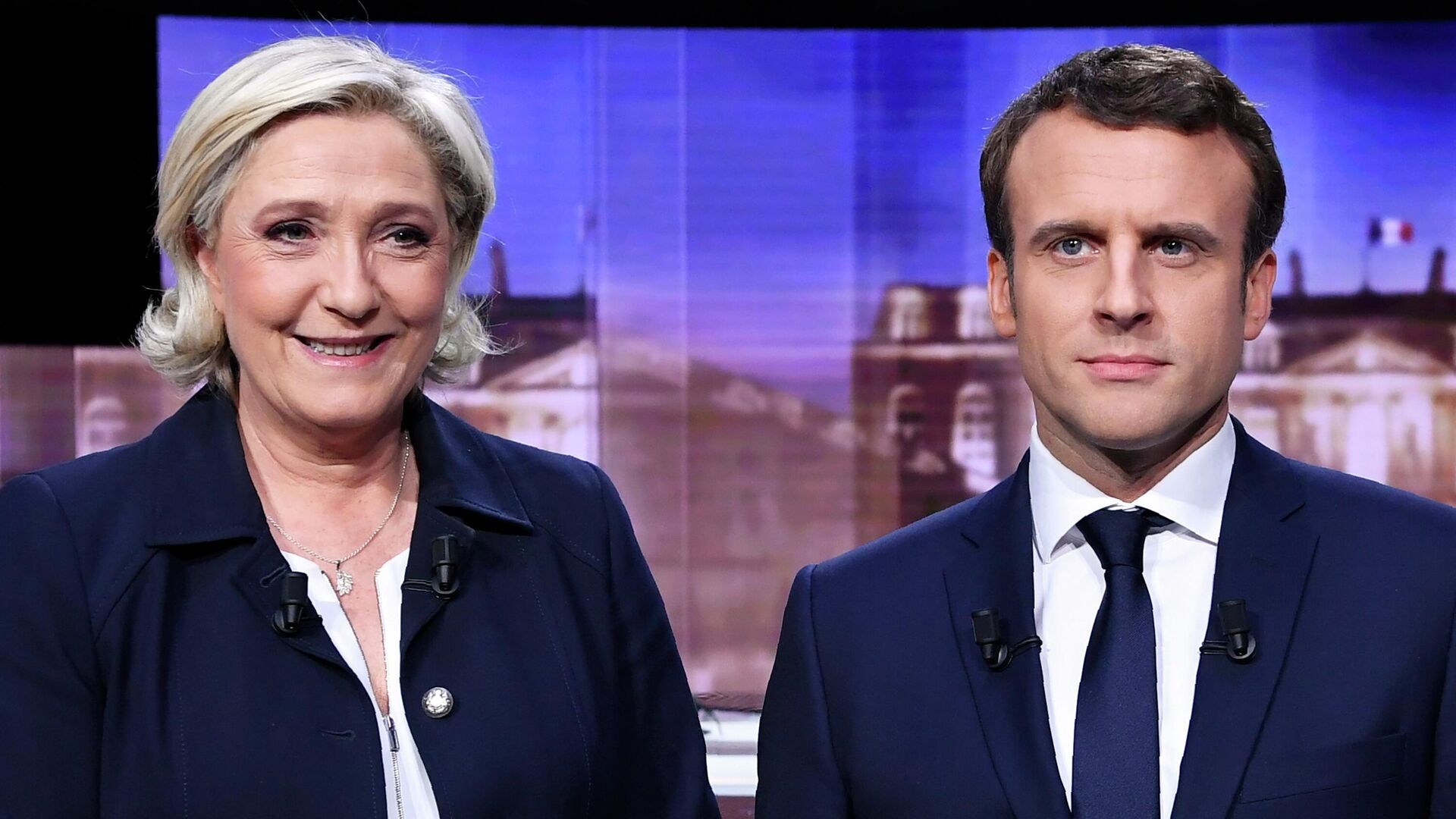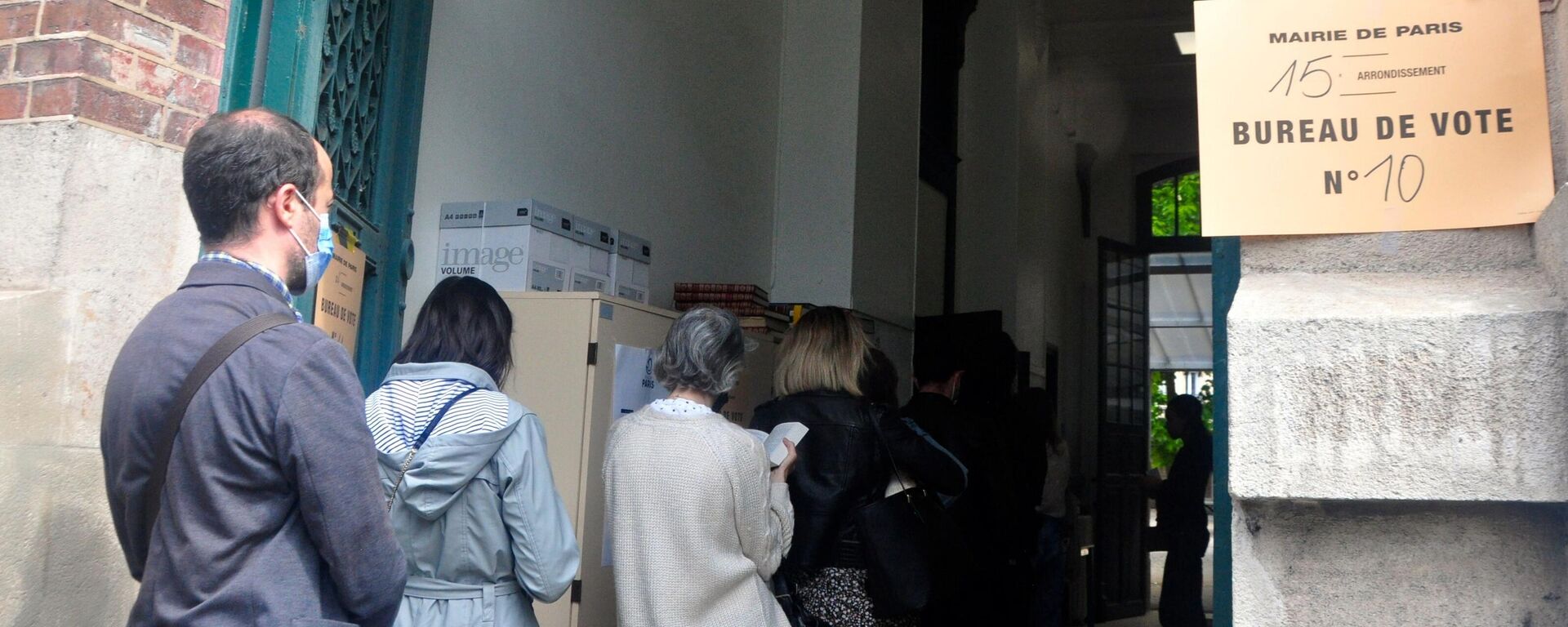https://sputnikglobe.com/20220424/macron-on-course-to-secure-second-presidential-term-leading-against-le-pen-with-57-of-vote---tv-1095017216.html
Le Pen Concedes Defeat in Presidential Election as Macron Projected to Win 57% of Vote
Le Pen Concedes Defeat in Presidential Election as Macron Projected to Win 57% of Vote
Sputnik International
The La Republique En Marche party founder and former Rothschild investment banker has replicated his 2017 win against National Rally candidate Marine Le Pen... 24.04.2022, Sputnik International
2022-04-24T18:05+0000
2022-04-24T18:05+0000
2022-04-24T19:31+0000
france
https://cdn1.img.sputnikglobe.com/img/07e6/04/18/1095003386_0:27:3001:1715_1920x0_80_0_0_1e488755f561d7733c1481e6650fa650.jpg
Incumbent Frence President Emmanuel Macron has achieved victory in Sunday's presidential elections, with rival Marine Le Pen conceding defeat.Speaking to supporters from her campaign headquarters on Sunday evening, Le Pen vowed to "carry on" her political career, and promised to "never abandon" the French people. The National Rally politician called her showing a "resounding victory," with her results narrowing the gap between herself and Macron by nearly 10 points compared to the 2017 election."I will lead this battle alongside [acting National Rally president] Jordan Bardella, along with all those who had the courage to oppose Emmanuel Macron in the second round" of the presidential race, she said. "I will continue my commitment to France and the French," she added.Le Pen said she felt "no resentment" from her defeat, saying she could not help but feel "a form of hope."Macron is the first French president in two decades to win a second five year term in office since Jacque Chirac did so in 2002.The French went to the polls for a second round of voting in presidential elections on Sunday. The first round, held on 10 April, saw Macron secure 27.85 percent of the vote against 23.15 percent for Le Pen, with La France Insoumise candidate Jean-Luc Melenchon coming in third with 21.95 percent. Melenchon threw his support behind Macron after his defeat, with several other left, liberal and green candidates also expressing support for the incumbent president.Macron's victory comes despite political pressures from both the left and right throughout much of his first term in office, from the Yellow Vests grass roots economic justice protests which began in 2018 and have taken place weekly ever since, to his government's hardline coronavirus response, which has sparked annoyance from bodily autonomy and freedom of choice advocates across the country, to a large-scale corruption scandal which has faced his government in recent weeks.About 28 percent of the electorate abstained from Sunday's runoff, with polling by Ipsos-Sopra Steria showing that 46 percent of the French had a "negative feeling" about the prospects of a second Macron term.Sunday's vote was Le Pen's third try for the Elysee Palace, with the 53 year old winning more and more votes each time around (17.9 percent in 2012, 33.9 percent in 2017, and a projected 42 percent in 2022), but failing to come out on top. Le Pen has successfully moved the National Rally (formerly the National Front) away from her father Jean-Marie Le Pen's radical right positions towards the political mainstream, without abandoning the party's Eurosceptical, nationalist, anti-globalization, and anti-immigration positions. In French and Western media, Le Pen and the National Rally are often labeled as broadly "far right," notwithstanding a number of economically left positions including opposition to raising the pension age, proposals to tax large corporations more heavily, proposals to expand social welfare and healthcare, and opposition to racism and prejudice. In 2015, Marine Le Pen expelled her father from the party over his inflammatory remarks about the Holocaust and the Vichy regime.
https://sputnikglobe.com/20220424/live-updates-2022-french-presidential-runoff-1095009811.html
france
Sputnik International
feedback@sputniknews.com
+74956456601
MIA „Rossiya Segodnya“
2022
News
en_EN
Sputnik International
feedback@sputniknews.com
+74956456601
MIA „Rossiya Segodnya“
Sputnik International
feedback@sputniknews.com
+74956456601
MIA „Rossiya Segodnya“
france
Le Pen Concedes Defeat in Presidential Election as Macron Projected to Win 57% of Vote
18:05 GMT 24.04.2022 (Updated: 19:31 GMT 24.04.2022) The La Republique En Marche party founder and former Rothschild investment banker has replicated his 2017 win against National Rally candidate Marine Le Pen, albeit at a reduced margin of victory.
Incumbent Frence President Emmanuel Macron has achieved victory in Sunday's presidential elections, with rival Marine Le Pen conceding defeat.
Speaking to supporters from her campaign headquarters on Sunday evening, Le Pen vowed to "carry on" her political career, and promised to "never abandon" the French people. The National Rally politician called her showing a "resounding victory," with her results narrowing the gap between herself and Macron by nearly 10 points compared to the 2017 election.
"The ideas we represent are reaching new heights...The result represents in itself a resounding victory," Le Pen said. The National Rally leader vowed to move forward with a "great electoral battle" for the upcoming French National Assembly elections, the first round of which is scheduled to take place on 12 June.
"I will lead this battle alongside [acting National Rally president] Jordan Bardella, along with all those who had the courage to oppose Emmanuel Macron in the second round" of the presidential race, she said. "I will continue my commitment to France and the French," she added.
Le Pen said she felt "no resentment" from her defeat, saying she could not help but feel "a form of hope."
Earlier, projections cited by French television channels indicated that Macron was leading Le Pen with a margin of 57.6-58.2 percent against her 41.8-42.4 percent.
Macron is the first French president in two decades to win a second five year term in office since Jacque Chirac did so in 2002.
The French
went to the polls for a second round of voting in presidential elections on Sunday. The first round, held on 10 April, saw Macron secure 27.85 percent of the vote against 23.15 percent for Le Pen, with La France Insoumise candidate Jean-Luc Melenchon coming in third with 21.95 percent. Melenchon threw his support behind Macron after his defeat, with several other left, liberal and green candidates also expressing support for the incumbent president.
Macron's victory comes despite political pressures from both the left and right throughout much of his first term in office, from the
Yellow Vests grass roots economic justice protests which began in 2018 and have taken place weekly ever since, to his government's
hardline coronavirus response, which has sparked annoyance from bodily autonomy and freedom of choice advocates across the country, to a
large-scale corruption scandal which has faced his government in recent weeks.
About 28 percent of the electorate abstained from Sunday's runoff, with polling by Ipsos-Sopra Steria showing that 46 percent of the French had a "negative feeling" about the prospects of a second Macron term.
Sunday's vote was Le Pen's third try for the Elysee Palace, with the 53 year old winning more and more votes each time around (17.9 percent in 2012, 33.9 percent in 2017, and a projected 42 percent in 2022), but failing to come out on top.
Le Pen has successfully moved the National Rally (formerly the National Front) away from her father Jean-Marie Le Pen's radical right positions towards the political mainstream, without abandoning the party's Eurosceptical, nationalist, anti-globalization, and anti-immigration positions. In French and Western media, Le Pen and the National Rally are often labeled as broadly "far right,"
notwithstanding a number of economically left positions including opposition to raising the pension age, proposals to tax large corporations more heavily, proposals to expand social welfare and healthcare, and opposition to racism and prejudice. In 2015, Marine Le Pen expelled her father from the party over his inflammatory remarks about the Holocaust and the Vichy regime.


